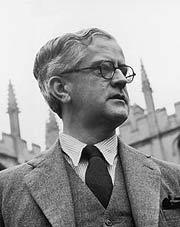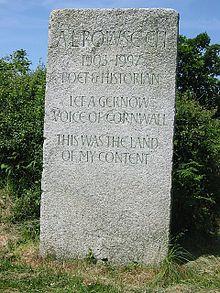


A Cornish poet and author
Dr. Alfred Leslie Rowse CH FBA (4th December 1903 – 3rd October 1997), known publicly as A. L. Rowse but to friends and family as Leslie, was a author and historian from Tregonissey, near St. Austell, the son of Richard Rowse, a china clay worker, and Annie (née Vanson). Despite his parents being poor and semi-illiterate, he won a place at St. Austell County Grammar School (now Poltair School – which has named part of its curriculum the Rowse Pathway) and then a scholarship to Christ Church, Oxford in 1921. He was encouraged in his pursuit of an academic career by a fellow Cornish man of letters, Sir Arthur Quiller-Couch, of Polperro, who recognised his ability from an early age. Rowse endured doubting comments about his paternity, thus he paid particular attention to his mother's association with a local farmer and butcher from Polgooth, near St. Austell, Frederick William May (1872–1953). Nonetheless any such frustrations were channelled into academia, which reaped him dividends later in life.
Rowse had planned to study English literature, having developed an early love of poetry, but was persuaded to read history. He was a popular undergraduate and made many friendships that lasted for life. He graduated with first class honours in 1925 and was elected a Fellow of All Souls College the same year. In 1929, he was awarded his Master of Arts degree, and in 1927 was appointed Lecturer at Merton College, where he stayed until 1930. He became a Lecturer at the London School of Economics.
In 1931, he contested the parliamentary seat of Penryn and Falmouth for the Labour Party, but was unsuccessful, finishing third behind the Liberals. In the general election of 1935 he again proved unsuccessful, however, managed to finish ahead of the Liberal in second place. In both the 1931 and 1935 elections, Maurice Petherick, was returned as Conservative MP to Parliament, albeit with a minority of the vote. Rowse became a supporter of calls made by the likes of Sir Stafford Cripps for a "Popular Front" whereby Labour and Liberals should unite at election time to defeat the National Government. While Cripps was expelled for his views, Rowse worked on getting "local arrangements" agreed by Labour and Liberal parties in Devon and Cornwall, making a common cause with the Liberal MP Sir Richard Acland. A general election was expected to take place in 1939, and Rowse, who was again Labour's candidate for Penryn and Falmouth, was not expected to have a Liberal opponent which would make his chances of winning much greater. However, due to outbreak of war, the election did not take place and effectively ended his political career.
Undeterred, he chose to continue his career at Oxford becoming Sub-Warden of All Souls College. In 1952, he failed in his candidacy for election as Warden against John Hanbury-Sparrow and shortly afterwards began his regular trips to The Huntington Library in California where for many years he was a Senior Research Fellow. He received a doctorate (DLitt) from Oxford University in 1953. After delivering the British Academy's 1957 Raleigh Lecture on History about Sir Richard Grenville's place in English history he became a Fellow of the Academy (FBA) in 1958. In 1968 he was made a Bard of Gorseth Kernow, taking the bardic name Lef A Gernow ('Voice of Cornwall'), reflecting his high standing in the Cornish community.
Rowse published about 100 books. He also became a celebrated author and much-travelled lecturer in the mid-20th century, especially in the United States. He also published many popular articles in newspapers and magazines in Great Britain and the United States. His brilliance was widely recognised, and his knack for the sensational, as well as his academic boldness (which some considered to be irresponsible carelessness), sustained his reputation. His opinions on rival popular historians, such as Hugh Trevor-Roper and A. J. P. Taylor, were expressed sometimes in very ripe terms. In his later years, Rowse moved increasingly towards the political right, and many considered him to be part of the Tory tradition by the time he died. One of Rowse's lifelong themes in his books and articles was his condemnation of the National Government's policy of appeasement in the 1930's and the economic and political consequences for Great Britain of fighting a second war with Germany. Another was his horror at the degradation of standards in modern society. He is reported as saying: "this filthy twentieth century. I hate its guts".
Rowse's first book was On History, a Study of Present Tendencies published in 1927 as the seventh volume of Kegan Paul's Psyche Miniature General Series. In 1931 he contributed to T. S. Eliot's quarterly review The Criterion. In 1935 he co-edited Charles Henderson's Essays in Cornish History for the Clarendon Press. His best-seller was his first volume of autobiography, A Cornish Childhood, first published by Jonathan Cape in 1942, which has gone on to sell nearly half a million copies worldwide. It describes his hard struggle to get to the University of Oxford and his love/hate relationship with Cornwall. It contains some of his best prose, as does his book on Tudor Cornwall.

His most controversial book (at the time of publication) was on the subject of human sexuality: Homosexuals In History published in 1977.
Rowse wrote poetry all his life. He contributed poems to Public School Verse whilst at St. Austell Grammar School. He also had verse published in Oxford 1923, Oxford 1924, and Oxford 1925. His collected poems A Life were published in 1981. The poetry is mainly autobiographical, descriptive of place (especially Cornwall) and people he knew and cared for, e.g. The Progress of Love, which describes his platonic love for Adam von Trott, a handsome and aristocratic German youth who studied at Oxford in the 1930's and who was later executed for his part in the July Plot of 1944 to kill Hitler. Unusually for a British poet, Rowse wrote a great number of poems inspired by American scenery. He maintained that in writing poetry one could get to the truth of a matter rather more than in prose.
Despite international academic success, Rowse remained proud of his Cornish roots. During 1953 he purchased Trenarren House just south of St. Austell, a much adored area of his. In 1995 and 1997 he was visited by HRH Prince Charles who became a close friend. He retired from Oxford in 1973 to Trenarren House, his Cornish home, from where he remained active as writer, reviewer and conversationalist until immobilised by a stroke the year before his death. His ashes are buried in the Campdowns Cemetery, Charlestown near St. Austell. There is a commemorative plaque to him in Truro Cathedral placed there in February 2000 and a memorial stone on Black Head, overlooking St. Austell Bay almost within sight of Trenarren was erected in July 1999.
Cornish Authors Famous Cornish People St. Austell